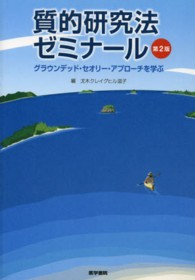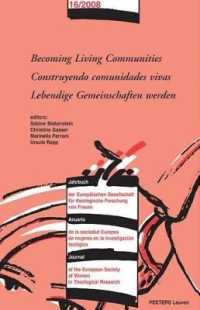- ホーム
- > 洋書
- > 英文書
- > History / World
Full Description
Douglas MacArthur is one of the most controversial generals in American military history. During World War II, some adored him while others mocked him as "Dugout Doug." His superiors, like President Franklin Roosevelt and General George Marshall, considered him indispensable as well as intolerable. Dwight Eisenhower, who once served under MacArthur, was not alone in thinking, "My God, but he was smart" and also "I just can't understand how such a damn fool could have gotten to be a general." Historians have been similarly conflicted, but while acknowledging that MacArthur was imperious, egotistical, insubordinate, paranoid, unfair to subordinates, and more, many have concluded that he was still a military genius. In this carefully researched and argued book that's sure to be as controversial as the general himself, James Ellman digs deep, connects the dots, and concludes that General MacArthur was decidedly not a military genius.
Highly intelligent, outspoken, old-fashioned as well as surprisingly modern, a self-promoter extraordinaire, a bonafide World War I hero who lived in the shadow of his Civil War hero father and under the thumb of his doting mother, Douglas MacArthur's rise through the U.S. Army's ranks was meteoric during an era when promotions came slowly. In 1930, he became Chief of Staff.
As Chief of Staff, MacArthur disobeyed President Hoover's orders during the Bonus Army March. A scandal surrounding his Filipino mistress saw him sue journalists, only to end up paying them a settlement. Even as he privately excoriated Roosevelt, he worked well with FDR, who found the general politically useful even while considering him and Huey Long "the two most dangerous men in America." MacArthur then became field marshal of the Philippine Army, but when war came in December 1941, the Philippines were caught ill-prepared. Recalled to United States service, MacArthur's vacillation led to the virtual destruction of the American bomber force in the Philippines, and during the fall of Bataan and Corregidor, he pursued unsound tactics and did not venture to the front lines. Awarded a politically motivated Medal of Honor by Roosevelt and paid a vast sum by the Filipino president, MacArthur escaped to Australia. For the next four years, as Supreme Commander of the Southwest Pacific theater, MacArthur was obsessed with retaking the Philippines - and in pursuing that self-centered goal, he ignored U.S. global strategy, insulted Allied partners like Australia, tried to one-up the U.S. Navy, and gave at least tacit approval to a presidential campaign to nominate him to run against Roosevelt in 1944.
Today MacArthur still polarizes. Many biographies agree he was a great commander marred by a few failures. Ellman argues the opposite: MacArthur was a lackluster commander whose reputation has been elevated by a few successes.






